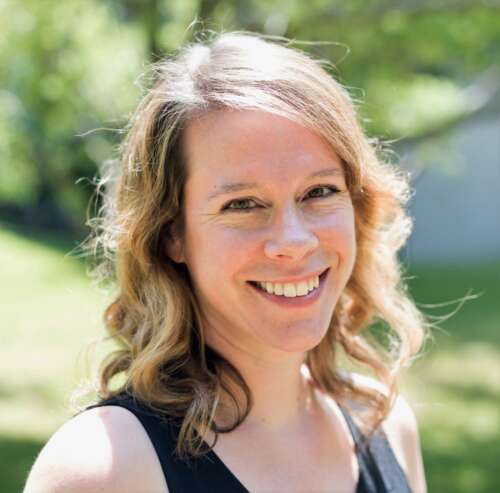
Helping adults conquer high needle fear and improving overall vaccination rates are the goals of a University of Guelph-led project that has received recent federal funding.
The two-year project will yield the first-ever electronic resource of its kind intended to help adults self-manage high levels of needle fear, said Dr. Meghan McMurtry, a professor in the Department of Psychology and director of the Pediatric Pain, Health and Communication Lab.
The project received $37,550 from Ottawa under the Immunization Partnership Fund administered by the Public Health Agency of Canada (PHAC).
Led by McMurtry, it’s part of a larger initiative headed by Dr. Anna Taddio, a pharmacy professor at the University of Toronto, that addresses needle fear among adults through pain management.
“Around one in 10 adults have such high needle fear that they will delay or avoid procedures like vaccination,” she said. “This project is designed to create a free, widely accessible, evidence-informed resource to enable people to self-manage their needle fear.”
High levels of needle fear are normally addressed through therapy with trained professionals, but that’s not accessible for many people for various reasons. Said McMurtry: “By creating a resource that’s freely available to individuals, we’re eliminating barriers of geography, money, waitlists, stigma. That’s the idea behind this as part of a stepped-care approach.”
This year, she will solicit feedback from adults with needle fear as well as mental health professionals and immunizers on an existing draft document that will ultimately serve as this new e-resource. She developed that document through an earlier series of reviews and meta-analyses and clinical practice guidelines.
As part of the project, she will also recruit Canadian adults with high needle fear to test the usability, feasibility and initial effectiveness of the e-resource.

McMurtry is working with various groups on the project, including Immunize Canada.
“Dr. McMurtry’s project is an example of extraordinary and timely University of Guelph research and knowledge turned to real-world application that truly improves and potentially saves lives,” said Dr. Malcolm Campbell, vice-president, research.
Campbell said that “over the past roughly 16 months, in which our world has been in the grip of the COVID-19 pandemic, the critical importance of vaccines has become obvious. All must have access to them.
“To help those who experience needle fear manage that fear is truly an act of compassion that benefits individuals and communities alike.”
“Needle fear is a real thing,” said Guelph MP Lloyd Longfield. “I know after donating blood over 100 times, each time I need to remind myself how important it is for me to overcome my own fear, to help other people who are having a worse day than me.
“When it came to vaccination, I also needed to remind myself again about the importance of accepting a needle. At the end of the day, the vaccination needle was in and out before I even felt it, thanks to the amazing nurses that put me at ease throughout the process. This research will help people like me to overcome their fears through better understanding.”
If results show promise, McMurty will make the resource freely available to Canadians. Based on her previous work with the World Health Organization on immunization stress-related responses, she believes there may be interest to adapt the tool internationally for people in low- and middle-income countries where access to mental health professionals may be more limited.
Other resources are already available but have yet to be tested empirically. Some provide only cursory information while others require readers to work through entire books. “As a stakeholder-informed resource, this will be new worldwide.”
The project is driven partly by PHAC’s interest in facilitating COVID-19 vaccinations, said McMurty, but it’s also intended for general use beyond the current pandemic.
Acknowledging that other factors including vaccine hesitancy can complicate immunization efforts for various infectious diseases, she said she hopes to address a major roadblock for many adults.
“We all need to be vaccinated at different times and needle fear has always gotten in the way.”
Contact:
Dr. Meghan McMurtry
cmcmurtr@uoguelph.ca